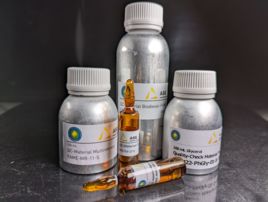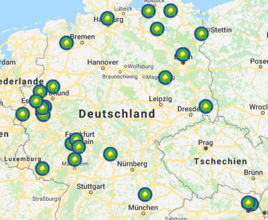Reviving biofuel markets in Germany: Biofuels industry presents catalogue of recommendations in Berlin
After the significant decline of the biofuels market share in transportation from 7,1% in 2007 to 5,9% in 2008, the new German government has promised a revitalization of the biofuel markets in their coalition agreement. In the now published draft law of the so called “Wachstumsbeschleunigungsgesetz” (“Law for accelerated growth”) the government proposes to freeze the actual tax on B100 and pure vegetable oils to this years’ rate for the next three years instead of the originally scheduled tax increase. But this measure won’t be sufficient to revitalize the markets, the more than 450 participants of the 7th International BBE/UFOP Conference on Biofuels, “Fuels of the Future 2009” on November 30th and December 1st in Berlin agreed.
In a comprehensive catalogue of measures the biofuel associations have handed over detailed recommendations to political decision makers showing how to re-incite steady and sustainable biofuel markets. “The own governmental report on biofuels development in Germany from September 2009 documents, that an economic production of biodiesel and pure plant oil is not feasible with the actual tax rate of 18 Cents per litre. How should then a freezing of this tax rate for the next three years contribute to a revitalization of the biofuel markets?”, Helmut Lamp, president of the German BioEnergy Association BBE addressed his question to policy. In case policy really wanted to support the biofuel sector, it would have to seize the results of the biofuels report and to lower the tax rate on B100 and PPO to 10 cents per litre at maximum is the persuasion of the biofuels industry.
Further on participants of the conference called policy makers for a withdrawal of the quota reduction for the year 2015 from former 8% to now 6,25%. With the decision in the coalition treaty to introduce E10 in the markets combined with the possibility to fulfil the obligation also by placing pure biofuels on the market, the basis of decision-making for reducing the biofuel quota would be obsolete. Also concerns about competition with the food sector for the feedstock resp. about the impact of an increased biofuel production on food prices have proven to be outdated with view on the developments of commodity prices of the last months.
With view on implementing sustainability requirements for biofuel production, the biofuels industry welcomed Federal Agency for Agriculture (BLE) to be the governing body for the implementation of the biofuels sustainability ordinance, including an advisory board in which practical issues will be discussed with industry. But still urgently needed rules and guidelines are missing but are announced to be published soon. It mustn’t be that further risks for farmers and producers arise just because EU Commission hasn’t managed to present their long announced guidelines yet, giving the frame for the rules in the member states. This is thought to happen in 2010. Therefore biofuel production in 2010 should be allowed without penalisation as both farmers and biofuel producers don’t have the needed planning security how to produce in line with the requirements. Also it is likely that in July 2010 – the date from which on biofuels have to prove their sustainable production – there will be a lack on certification schemes same than certification companies.
„Minimum requirements on sustainable feedstock production are urgently needed as it is clear that world energy demand will increase significantly while our fossil resources will decline at the same time. But still the implementation of these requirements within the biofuel sustainability ordinance has proven to be quite problematic in practise. The administrative presets have been underestimated in their broad impact not only by the civil servants at EU Commission, but also by the German government”, Dr. Klaus Kliem, president of UFOP raised his concerns and plaid for postponing the deadline for the implementation of the ordinance until practicable solution have been found.
The catalogue of measures with the recommendations of the German biofuel industry can be downloaded at BBE’s website www.bioenergie.de
The International BBE/UFOP-Conference on biofuels „Fuels of the Future“ is the annual meeting point of the biofuels industry, to discuss strategies for a sustainable market development with decision makers from policy and industry. On November 30th and December 1st more than 450 stakeholders in the biofuel sector from 30 countries gathered in Berlin underlining the conference’s status of being the lead event for shaping the frame for biofuels policy in Germany and Europe.





